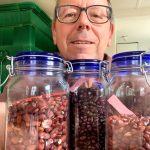
What is your name? What are the main projects or organisations you are currently involved in? Can you briefly present their activity and your function?
My name is Rūta Beirote and I represent, together with my sister Santa, the farm and family of the Zutini house. Together with our parents and children we run a small farm, where we grow cereals, tomatoes and also legumes – beans and peas.
I am a member of Slow Food Straupe, so the traditions and ideas of Slow Food are respected on our farm as well.
Zutini is the biggest bean farm, so besides the popular varieties, we also grow old and protectable varieties of beans and peas. We keep a collection of beans collected from all over Latvia, which allows us to present at least 200 varieties at the moment and show how colourful a country can be.
At the same time we collect interesting beans and peas from all over the world, to show the population of legumes for inter-elements. Like a small bean museum.
So, with the legumes, we work on two social projects:
1. Education of children
Through legumes we teach biodiversity, modification of natural varieties, cultivation and seed saving. Schools and kindergartens can also get interesting beans from us for their playgrounds and lessons.
2. Exchange of knowledge between older people
Giving and receiving. We travel by car and visit senior citizens’ associations to look for old knowledge, varieties and also to cook together. We share new ideas on how to prepare legumes outside the traditional methods.
Last visit in pictures here.
As seed keepers we also have a good social action for Christmas. We say that the best and most meaningful Christmas present is our “bean treasure box”. So that everyone who has a plot of land or a balcony can grow their own food, we are offering a “Bean Treasure Box for the next bean grower”.
We are pleased that so many people and companies choose the “bean boxes” as gifts for adults and children.
And finally, the most delicious part is the cooking of the beans. As representatives of the traditional cuisine, we do not only grow beans, but also teach how to cook them in an ancient and traditional way and in a modern way. So on our homepage and in social media you will find many recipes with beans. You can hear my name on some TV shows and you can certainly meet us and taste our bean dishes at the Slow Food market in Straupe on Sundays.

©Zutini (Facebook page)
What do you think are the biggest challenges for producers, and for consumers?
For Latvian growers, the biggest challenge is to grow beans and harvest them in autumn. When the summer is very short, our land cannot give us a good harvest so there can only be a few varieties. Moreover, it is not possible to harvest beans mechanically with machines. Growing beans in Latvia will always be manual work. And this means that imported beans will always be needed to meet the demand of customers in the country.
And this is where we see the choice: imported beans are much cheaper than locally grown ones, so some of the consumers choose a better price instead of local food.
The second biggest problem is bean borers (small black bugs). Especially for beans. In the last five years, the cultivation of beans in allotments has decreased dramatically. As the “European green course” requires more beans to be grown for animal feed, this also affects edible beans. And people are not ready to eat beans with insects, but there are no organic solutions for this problem and all other solutions are not allowed.
What fact(s) about legumes do you find most compelling for their promotion?
The good things we use in our consumer campaigns:
- nutritional value.
- hearty food (you don’t need to use much product).
- can be used not only as a meat substitute, which is not important for everyone, but also instead of white wheat flour.
- a source of protein that can also be eaten in cakes and desserts.
Would you like to share specific information with the Global Bean club? (event coming up soon, link to a website)
Our biggest legume events of the year are Christmas and New Year. On these occasions, all Latvians eat boiled snow peas with meat and onion sauce. It is a must-have dish at every table on Christmas Eve. So, once a year, legumes like grey peas are also eaten by Latvians who do not eat legumes at all 🙂
So – Merry and PeasFull Christmas Time! 🙂
You can read the article of Ruta : The Latvian way to eat Fava beans
How did you fall in love with legumes?
All Latvians love legumes. We get it from our grandmothers. Because in winter, when it is almost dark, we need to make our long evenings interesting. One of the old traditions is that the elders get together with the children to sing songs, study books, guess riddles and peel beans from the pods.
I used to do this in my childhood too. My grandmother had about 10 varieties of beans and peeling them was our winter job. Each pod was like a little gift – you could never tell what colour was inside.
So I let the beans surprise me now too, when I grow up and my grandmother is no longer around.
Do you have a favorite legume and why? Tell us about your personal experiences with legumes.
I can’t have favourites. As I am not only a bean farmer, but also a bean cook, I need to see the good and tasty side of every bean.
For example, the large white beans, which we grow.
The big white beans were considered unfit for soup. Latvians have a different sense of what soup should taste like. Soup should have a strong bean taste and be mealy. And large white beans did not give it.
So I had to turn this disadvantage into an advantage – by creating recipes so that these beans could be eaten in desserts, if they are not suitable for Latvian tasting soup. There are no unpleasant beans, only inappropriate foods.
But still…
Beans and green beans, I can eat a lot more of them than all the others… 🙂

©Zutini (Facebook page)




